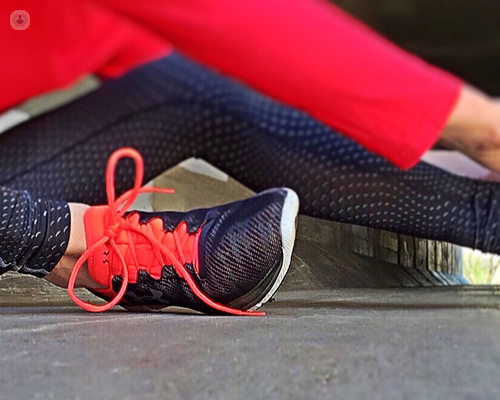Living with chronic cystitis: How to manage symptoms of interstitial cystitis
Autore:Interstitial cystitis, also referred to as painful bladder syndrome, is a chronic condition that causes persistent pain and discomfort in the bladder and pelvic area. A leading consultant urologist tells us all about it in this informative article.

What is interstitial cystitis?
Interstitial cystitis is unlike a typical urinary tract infection, and doesn't involve bacterial infection. This means antibiotics are not an effective treatment. Symptoms can vary in severity and may come and go, making it a challenging condition to manage.
What are the symptoms of interstitial cystitis?
The symptoms of interstitial cystitis can differ from person to person. Common signs include:
- Persistent bladder pain or pressure.
- Frequent urination, often in small amounts.
- A strong, urgent need to urinate.
- Pain during intercourse.
- Discomfort or pain that worsens as the bladder fills.
- Pain that may extend to the lower back, abdomen or pelvic floor.
The condition can significantly impact daily life, causing sleep disturbances, emotional stress and difficulty participating in normal activities.
How can I manage symptoms of interstitial cystitis?
Managing interstitial cystitis involves a combination of lifestyle changes, dietary adjustments, and medical treatments. Here are some practical ways to alleviate symptoms:
Identifying and avoiding triggers
Certain foods and beverages can aggravate symptoms. Common triggers include caffeine, alcohol, spicy foods, acidic fruits and artificial sweeteners. Identifying personal triggers via a food diary can be helpful. By avoiding these items, many patients experience reduced symptom flare-ups.
Following a bladder-friendly diet
A diet tailored for interstitial cystitis often includes non-acidic, mild foods that do not irritate the bladder. Recommended options may include:
- Plain water for hydration.
- Low-acid fruits such as blueberries and pears.
- Vegetables like cucumbers and green beans.
- Lean proteins like chicken and fish.
Consulting a dietitian can help develop a personalised meal plan.
Practising bladder training techniques
Bladder training involves gradually increasing the time between urination to improve bladder capacity and reduce urgency. This process should be done under the guidance of a healthcare provider to avoid unnecessary discomfort.
Stress management
Stress is known to exacerbate symptoms in many patients with interstitial cystitis. Techniques such as mindfulness, yoga, meditation, or counselling can be beneficial in reducing stress and managing emotional well-being.
Staying hydrated
Although frequent urination is a symptom of interstitial cystitis, staying adequately hydrated is crucial. Dehydration can concentrate urine and worsen bladder irritation. Sipping water throughout the day can help maintain proper hydration.
How is interstitial cystitis treated?
When lifestyle adjustments are insufficient to control symptoms, medical interventions may be necessary. These can include:
Oral medications
Some medications prescribed for interstitial cystitis include:
- Pain relievers to manage discomfort.
- Antihistamines to reduce bladder inflammation.
- Pentosan polysulfate sodium (Elmiron), which may help restore the bladder lining.
Bladder instillations
This treatment involves introducing medication directly into the bladder through a catheter. The medications may include anti-inflammatory or numbing agents to provide temporary relief.
Physical therapy
Pelvic floor physical therapy can address muscle tension and dysfunction that contribute to bladder pain. A trained physiotherapist can guide exercises and relaxation techniques tailored to individual needs.
Nerve stimulation
Techniques such as sacral nerve stimulation or transcutaneous electrical nerve stimulation (TENS) can help manage pain and improve bladder function by influencing nerve pathways.
Surgery
In severe cases where other treatments have not been successful, surgical options may be considered. These are typically a last resort and can include procedures to increase bladder capacity or remove the bladder altogether. Surgery is rare and only recommended in extreme cases.
Emotional support and coping strategies for chronic cystitis
Living with interstitial cystitis can be emotionally challenging. Joining support groups, either online or in person, can provide a sense of community and understanding. Speaking with a mental health professional can also help address feelings of frustration or isolation that may accompany chronic illness.
When should I seek medical advice for interstitial cystitis?
If you experience symptoms of interstitial cystitis, it is important to consult a healthcare provider. Early intervention and management can help reduce the impact of the condition on daily life. A specialist, such as a urologist, can perform the necessary tests to diagnose interstitial cystitis and develop an appropriate treatment plan.
While interstitial cystitis is a chronic condition with no definitive cure, symptom management is possible through a combination of lifestyle adjustments, dietary changes and medical treatments. Each patient’s experience is unique, so a personalised approach to care is essential. By working closely with healthcare providers and adopting coping strategies, individuals with interstitial cystitis can improve their quality of life.


